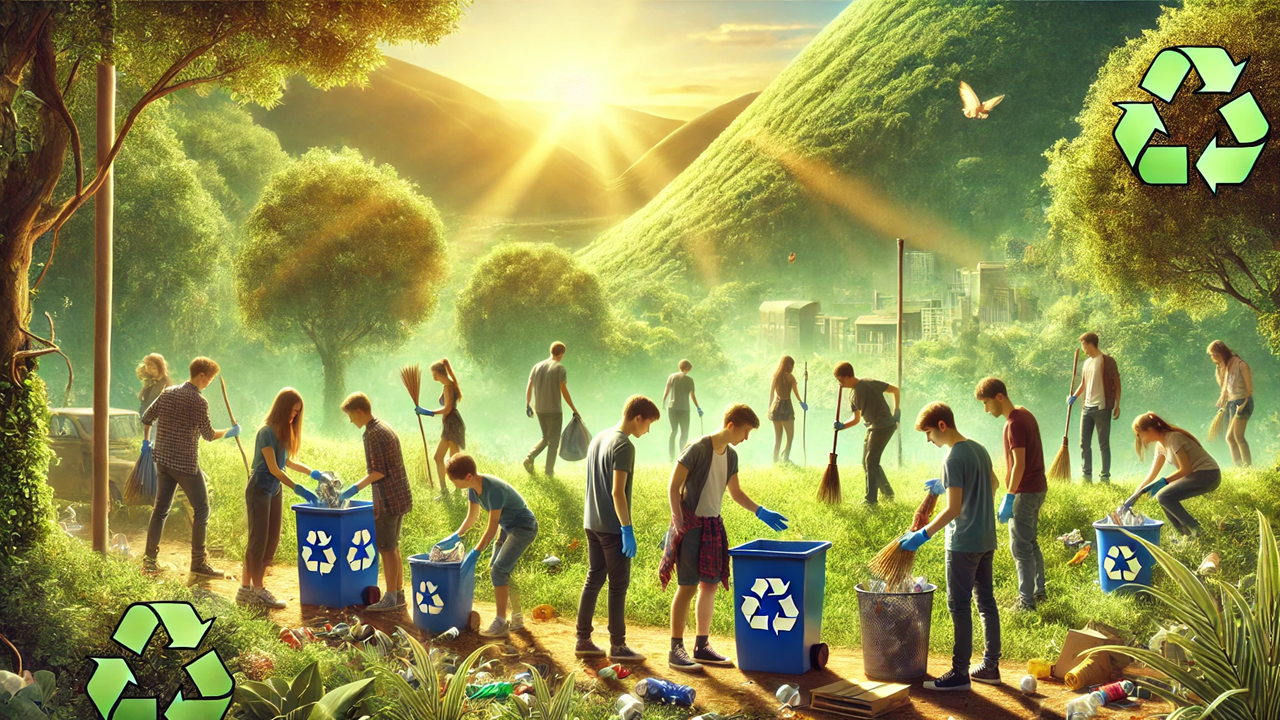Turning Trash into Treasure: Youth Leading the Charge for a Zero-Waste Future
The article discusses the "Global Waste Management Outlook 2024 for Youth," a report by UNEP that emphasizes the critical role youth play in addressing global waste management issues. The report highlights the impact of waste on climate change, biodiversity, and health, urging a shift toward a circular economy. It calls for youth engagement in influencing policies, advocating for sustainable business practices, and leading waste reduction initiatives.

The Future in Their Hands
In a world where the daily grind often blinds us to the long-term consequences of our actions, a critical issue is building in the background: waste. Every year, more than two billion tonnes of municipal solid waste pile up across the globe—an amount so vast it could stretch to the moon and back if packed into shipping containers. This monumental problem, however, is being met with an inspiring response from the most unlikely of heroes: the youth.
According to the "Global Waste Management Outlook 2024 for Youth: Beyond an Age of Waste – Turning Rubbish into a Resource," the younger generation is being called upon to lead the charge toward a zero-waste future. The United Nations Environment Programme (UNEP), in this groundbreaking report, emphasizes the vital role youth must play in tackling the global waste crisis.
Waste: A Global Crisis
Waste is not just an eyesore; it’s a catalyst for some of the most pressing global crises, including climate change, biodiversity loss, and pollution. The report underscores that if we do not drastically reduce the amount of waste we produce and improve how we manage it, our planet’s future is at risk.
One of the most alarming aspects highlighted in the report is the impact of waste on climate change. For instance, when food waste rots in landfills, it releases methane—a greenhouse gas far more potent than carbon dioxide. Additionally, the burning of waste, often seen in communities without waste collection services, releases harmful soot that contributes to rising sea levels by melting polar ice caps.
But it’s not just the climate that’s affected. Waste is also a significant threat to biodiversity. Indiscriminate disposal practices introduce hazardous chemicals into ecosystems, leading to long-term damage. Plastic waste, in particular, is notorious for breaking into tiny particles that infiltrate the food chain, potentially causing large-scale disruptions in biological functions.
How Much Is Too Much?
The report paints a grim picture of global waste generation, which varies drastically across regions. Wealthier countries, where consumerism thrives, produce significantly more waste per capita compared to less affluent regions. For example, the average person in North America generates more than two kilograms of waste daily, while in Central and South Asia, the figure is a mere 400 grams.
If these trends continue unchecked, the report warns that by 2050, the annual amount of waste could nearly double, further straining the planet’s already stressed ecosystems and waste management systems.
A Call for Circular Economy
In response to this looming crisis, the UNEP report champions the concept of a circular economy—a system where products are designed to be reused, recycled, and last as long as possible. This approach contrasts sharply with the current linear economy, which follows a 'take, make, dispose' model, contributing significantly to waste.
To achieve this transformation, the report calls for a concerted effort from governments, businesses, and consumers alike. It urges governments to encourage waste-preventing product designs, businesses to rethink their manufacturing processes, and consumers to make more conscious purchasing decisions.
The Cost of Ignoring Waste
Effective waste management is not just a logistical challenge but a financial one as well. In 2020, the global cost of waste management services was around $250 billion. However, when factoring in the hidden costs of pollution, such as health impacts and environmental degradation, the true cost balloons to $360 billion.
The report stresses that mismanaging waste leads to far greater societal costs than the price of implementing proper waste management systems. It’s a simple economic truth that investing in waste prevention and management today will save far more in the future.
Youth: The Architects of a Sustainable Tomorrow
The UNEP report concludes with a powerful message: the youth of today are the leaders of tomorrow, and their actions will shape the future of waste management. It encourages young people to get involved by influencing government policies, advocating for business practices that reduce waste, and leading by example in their communities.
The report also highlights the potential for youth to become zero-waste entrepreneurs, offering innovative solutions like upcycling waste materials, starting refill services or developing apps that improve waste collection.
The path to a sustainable future is clear: it’s about reducing waste, rethinking how we consume, and embracing the circular economy. The Global Waste Management Outlook 2024 for Youth offers a roadmap, and with the energy and creativity of today’s youth, a zero-waste world is within reach.
- FIRST PUBLISHED IN:
- Devdiscourse










